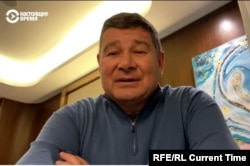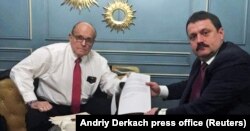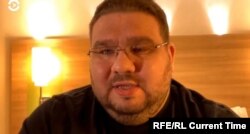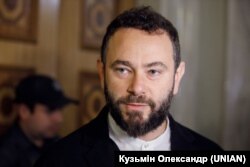In interviews with Current Time, a Ukrainian businessman and ex-diplomat sanctioned this week by the U.S. Treasury Department have denied that they acted as Russian agents seeking to influence the 2020 U.S. presidential elections.
The Treasury Department charged on January 11, 2021 that businessman Oleksandr Onishchenko and Andriy Telizhenko, a former official at Ukraine’s Washington, D.C. embassy, were among seven Ukrainians and four websites acting as part of “a Russia-linked foreign influence network” to promote allegations that U.S. officials had “engaged in corruption, money laundering, and unlawful political influence in Ukraine.”
“Russian disinformation campaigns targeting American citizens are a threat to our democracy,” the Department quoted Treasury Secretary Steven T. Mnuchin as saying. “The United States will continue to aggressively defend the integrity of our election systems and processes.”
Businessman Onishchenko, a former energy company magnate and Olympic show-jumper, rejected the charges as ungrounded. The U.S. sanctions can have no effect on him, he underlined on January 12, speaking to Current Time's Evening newscast from Germany, where he now resides.
“They can’t harm me in any way,” Onishchenko said of the penalties. “And so,” he continued with a shrug, “you could say I’m living under sanctions. I’m not involved in business, I don’t live in the U.S., I don’t work with U.S. companies.”
Under the sanctions, the seven Ukrainians and four websites listed are blocked from accessing any assets in the United States and engaging in business with U.S. citizens. Any U.S.-based entity in which they hold at least a 50- percent interest is also "blocked."
Onishchenko claims that he learned from the press that his name featured among the Treasury Department’s list of sanctioned Ukrainians.
U.S. officials charge that Onishchenko handed over “edited audio recordings” of supposed conversations between ex-Ukrainian President Petro Poroshenko and U.S. officials to Andriy Derkach, a non-party Ukrainian parliamentarian alleged to act as the kingpin for this supposed Kremlin-run influence network.
In one recording of a supposed February 18, 2016 phone conversation between then U.S. Vice-President Joe Biden and President Poroshenko, two male voices are heard discussing Ukraine’s cooperation with the International Monetary Fund, the nationalization of oligarch Ihor Kolomoiskiy’s Privatbank, and the activities of the Ukrainian energy firm Burisma, where Biden’s son, Hunter Biden, once served on the board of directors.
Derkach, a non-party member of the Ukrainian parliament, released the first recordings in the spring of 2020. He claimed that they prove “international corruption and state treason at the highest level of [the Ukrainian] state.” Rather than Onishchenko, he credited “journalist-investigators” with finding the recordings.
The audio proliferated online, contributing to what disinformation experts considered a smear campaign against Biden, then a leading Democratic Party candidate for president.
To Onishchenko, the very fact that the Treasury Department included him in the sanctions list suggests that the recordings were legitimate.
“They (the U.S. Treasury Department) apparently know better [than I do] what I handed over,” Onishchenko commented. “We’ll refer to their information that they are right.”
“But the fact that they confirmed themselves that there’re recordings, that they acknowledged them, suggests, above all, that the recordings are the original ones. I think that the (Ukrainian) prosecutor general has all the grounds necessary to launch a criminal case against Petro Poroshenko.”
Derkach, also sanctioned by the U.S. Treasury Department in September 2020, did not respond to Current Time’s questions. He has previously denied the U.S. claim that he acted as a Russian agent attempting to interfere in the country’s 2020 presidential vote.
Derkach has been photographed meeting in 2019 with President Trump’s personal attorney, Rudy Giuliani, in Kyiv during Giuliani’s attempt to find evidence of wrongdoing by the Bidens.
President Trump’s attempts to convince President Zelenskiy and other Ukrainian officials to pursue a criminal investigation of Hunter Biden led to the U.S. leader’s 2019-2020 impeachment. Trump was acquitted.
One individual who allegedly assisted in Giuliani’s efforts, ex-Ukrainian diplomat Andriy Telezhinko, now also faces U.S. sanctions.
In response, Telezhinko, who worked at Ukraine’s Washington, D.C. embassy during the 2016 U.S. presidential campaign, told Current Time that he has no foreign investments and nothing to hide. He termed the reason for his inclusion in the list of sanctioned Ukrainians “a lie” and asserted that he will defend himself in court.
Describing himself as a “whistleblower,” Telezhinko said that the U.S. government has raised no complaints against him in the four years since he alleged to Politico, a U.S. political news site, that the Ukrainian embassy had collaborated with representatives of the Democratic Party during the 2016 U.S. presidential campaign.
In autumn 2020, however, U.S. media reported that the U.S. State Department had canceled Telezhinko’s U.S. visa.
Telezhinko, who lives outside Ukraine, alleged to Current Time that he flies to the United States without problem, but declined to identify the date of his last such trip.
Without further elaboration, the former diplomat added that he intends “to continue [my] political activities and prove the truth.”
A third sanctioned figure, Oleksandr Dubinskiy, a parliamentary deputy from Ukrainian President Volodymyr Zelinskiy’s Servant of the People Party, has made similar charges to Telezhinko’s about Ukraine’s Poroshenko-era ties with the U.S.
Dubinskiy, a YouTube blogger and former business journalist and TV show host, has alleged that Ukraine’s anti-corruption bodies are managed from Washington, D.C.
In October 2020, the Ukrainian non-governmental organization Anti-Corruption Action Center sent the U.S. Treasury Department a detailed list of Dubinskiy’s actions that they consider corrupt and in the Kremlin’s interests.
The Kyiv-based watchdog plans to send a similar list to European Union officials.
Dubinskiy and his associates regularly travel to the EU for vacation or medical treatment, noted Vitaliy Shabunin, head of the Center’s executive board.
“If these guys love the Russian world so much, then let them go there and get treated,” Shabunin commented. He rejected contentions that the sanctions amount to payback for Dubinskiy’s earlier allegations.
Current Time repeatedly tried to reach Dubinskiy, but he did not answer his telephone.
On January 13, the head of President Zelenskiy’s office, Andriy Yermak, tweeted in English that, “regardless of party affiliation,” the Zelenskiy administration “will do everything in its power to hold those responsible for meddling in US elections.”
Aside from Dubinskiy, Onishchenko, and Telezhinko, sanctions have also been brought against ex-prosecutor Konstyantyn Kulyk, who featured in the 2019 Trump impeachment investigation; two Derkach employees (Anton Simonenko and Petro Zhuravel); one Derkach promoter (Dmytro Kovalchuk); and four websites allegedly linked to Derkach.
Shabunin’s colleague, Darya Kalenyuk, executive director of the Anti-Corruption Action Center, doubted, however, that the U.S. government would spread word of such sanctions without proof.
Those sanctioned aimed “to use Ukraine like a football, so that we’d just be thrown from one political force to another on the U.S. political field,” Kalenyuk claimed.
Their aim was to make Ukraine fall out with the West, Kalenyuk contended, and “to turn Ukraine’s path of development around by 180 degrees.”
-With additional reporting from AP and Reuters









